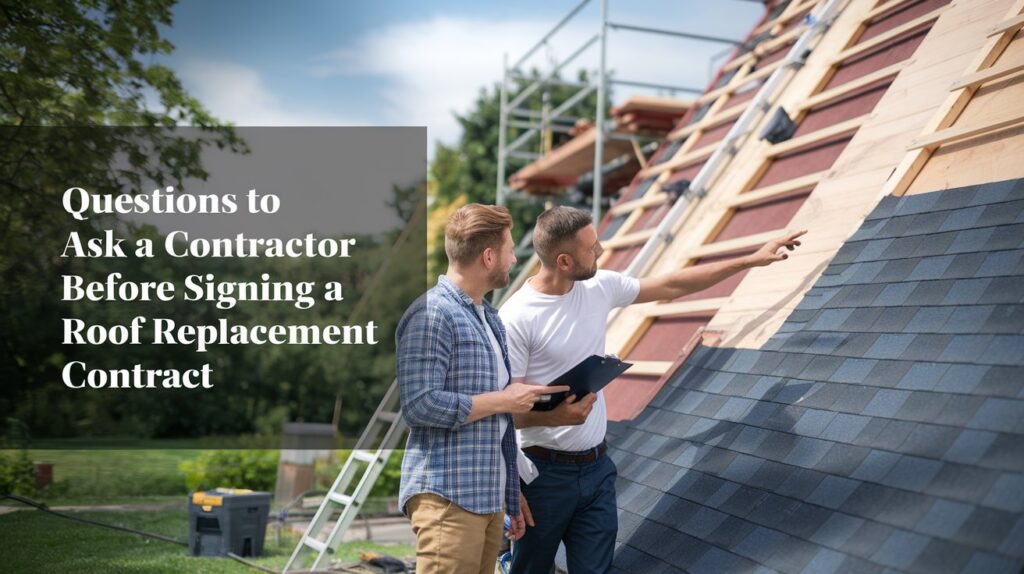Replacing a roof is one of the most significant investments a homeowner can make. It’s a decision that affects not only the aesthetic appeal of the home but also its structural integrity and long-term value.
We will explore the key questions every homeowner should ask a roofing contractor before committing to a replacement project. These questions help clarify expectations, avoid misunderstandings, and ensure the contractor is qualified to deliver quality work. Gathering information upfront can make the difference between a smooth, successful project and one filled with costly surprises.
Choosing the Right Partner for a Successful Roof Replacement
Understanding Licenses, Insurance, and Warranties
One of the first areas to discuss with roofing contractors involves their credentials and protections. Homeowners should ask whether the contractor holds a valid license to operate in their state and whether they carry adequate insurance, including liability and workers’ compensation coverage. This protects the homeowner from being financially responsible for injuries or property damage that might occur during the project.
It’s equally important to inquire about warranties on materials and workmanship. Contractors should be able to explain what is covered, how long the coverage lasts, and what steps to take if a problem arises after installation. Homeowners working with a roof replacement contractor in Houston should pay particular attention to regional warranty terms, given the unique weather challenges that roofs face in that area.
By confirming these details upfront, homeowners know the contractor stands behind their work and has safeguards to handle unforeseen issues. This transparency sets a foundation of trust and accountability from the start.
Clarifying the Project Timeline and Scope of Work
Another critical conversation with a roofing contractor focuses on the timeline and specific scope of the project. Homeowners should ask when the contractor expects to begin work and how long the replacement will take, factoring in weather delays or material availability.
It’s wise to request a written schedule that outlines major milestones, such as removing the old roof, installing new materials, and final inspection. Equally important is understanding the full scope of work included in the contract.
This includes clarifying whether the quote covers removing the old roofing layers, disposal fees, permits, replacement of damaged decking, and any upgrades to underlayment or ventilation systems.
By asking these questions upfront, homeowners can avoid unexpected add-ons or misunderstandings mid-project. Clear documentation of what is and isn’t included in the price protects both parties and ensures that everyone works from the exact expectations. A detailed contract not only lays out responsibilities but also sets benchmarks for accountability.
Assessing the Contractor’s Communication and Dispute Resolution Plan
Communication is vital to any home improvement project, especially one as disruptive as a roof replacement. Before signing a contract, homeowners should ask how the contractor will provide updates throughout the job and who will serve as the primary point of contact.
Establishing this communication channel prevents confusion and ensures that concerns are addressed promptly. It’s also valuable to discuss how the contractor handles unexpected problems, such as discovering hidden structural damage once the old roof is removed. A reputable contractor should have a transparent process for notifying the homeowner, presenting options, and getting written approval for additional work or costs before proceeding.
Finally, homeowners should inquire about how disputes or warranty claims will be handled after completing the project. Understanding the contractor’s approach to resolving issues provides insight into their commitment to customer satisfaction and ethical business practices. These conversations help lay the groundwork for a professional, cooperative relationship throughout the project.
Inquiring About Subcontractors and Crew Supervision
An often overlooked yet critical question involves who will be performing the work. Homeowners should determine whether the contractor uses their employees or hires subcontractors to replace the roof. If subcontractors are involved, asking about their qualifications, insurance coverage, and who will be supervising them on-site is essential.
Without proper oversight, quality control issues can arise. Clarifying who will manage the crew ensures accountability on the job site and that the workmanship meets the contractor’s promised standards. Homeowners should also ask how many workers will be onsite each day and whether a supervisor or project manager will be present during all key phases of the installation.
Understanding the team structure provides reassurance that the project will stay on track and that questions or concerns can be addressed promptly as the work progresses.
End Note
Selecting a roofing contractor is about more than finding the lowest bid; it’s about choosing a partner who is transparent, qualified, and committed to quality. By asking thoughtful questions about licensing, insurance, warranties, timelines, project scope, and communication practices, homeowners can make an informed decision that safeguards their investment.
A well-drafted contract reflects these conversations and ensures expectations are documented for both parties. With the proper preparation and due diligence, a roof replacement project can be a seamless process that enhances the home’s value, safety, and curb appeal for years. Determining contractors thoroughly is the first step toward achieving a successful, stress-free roofing experience.

